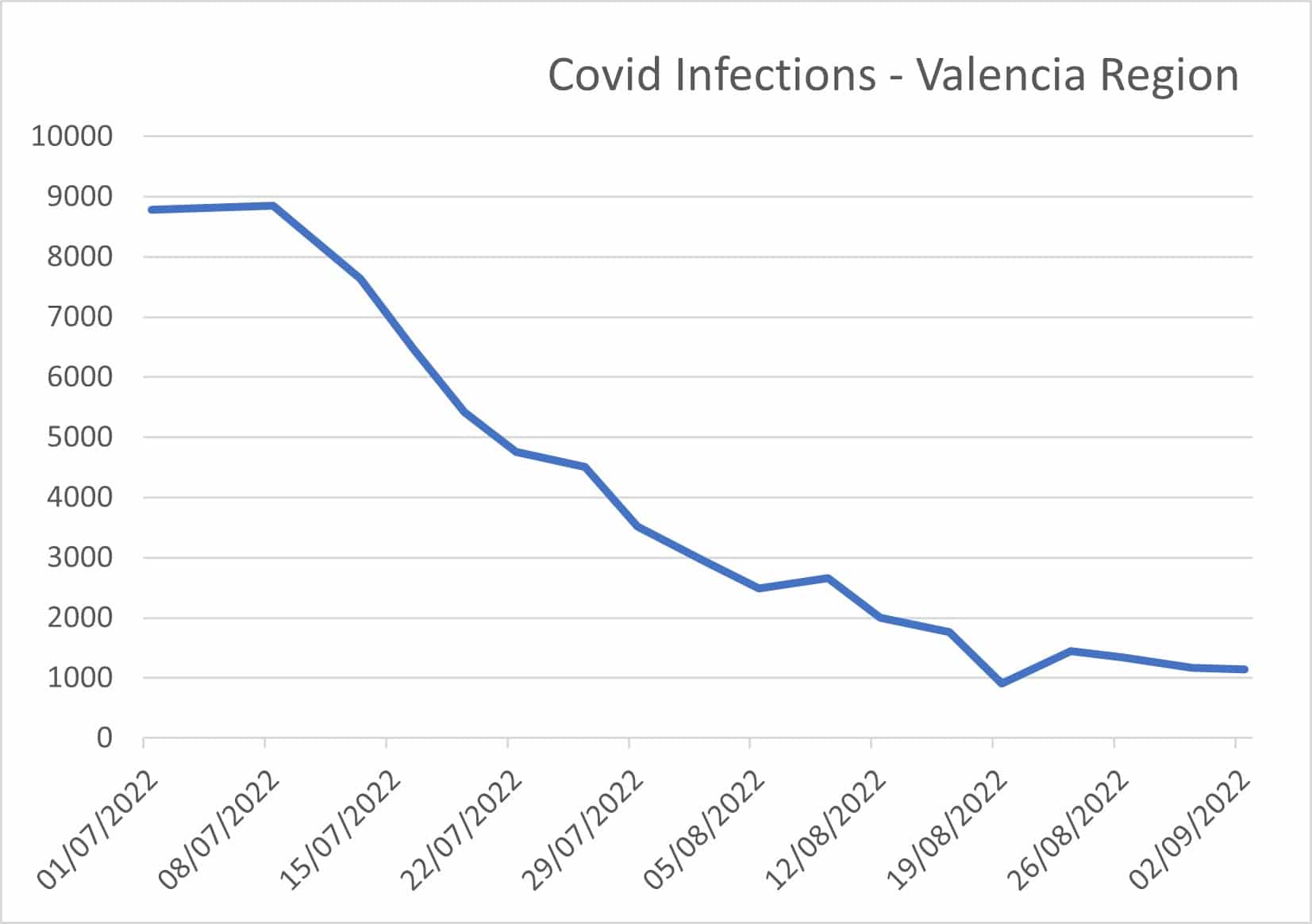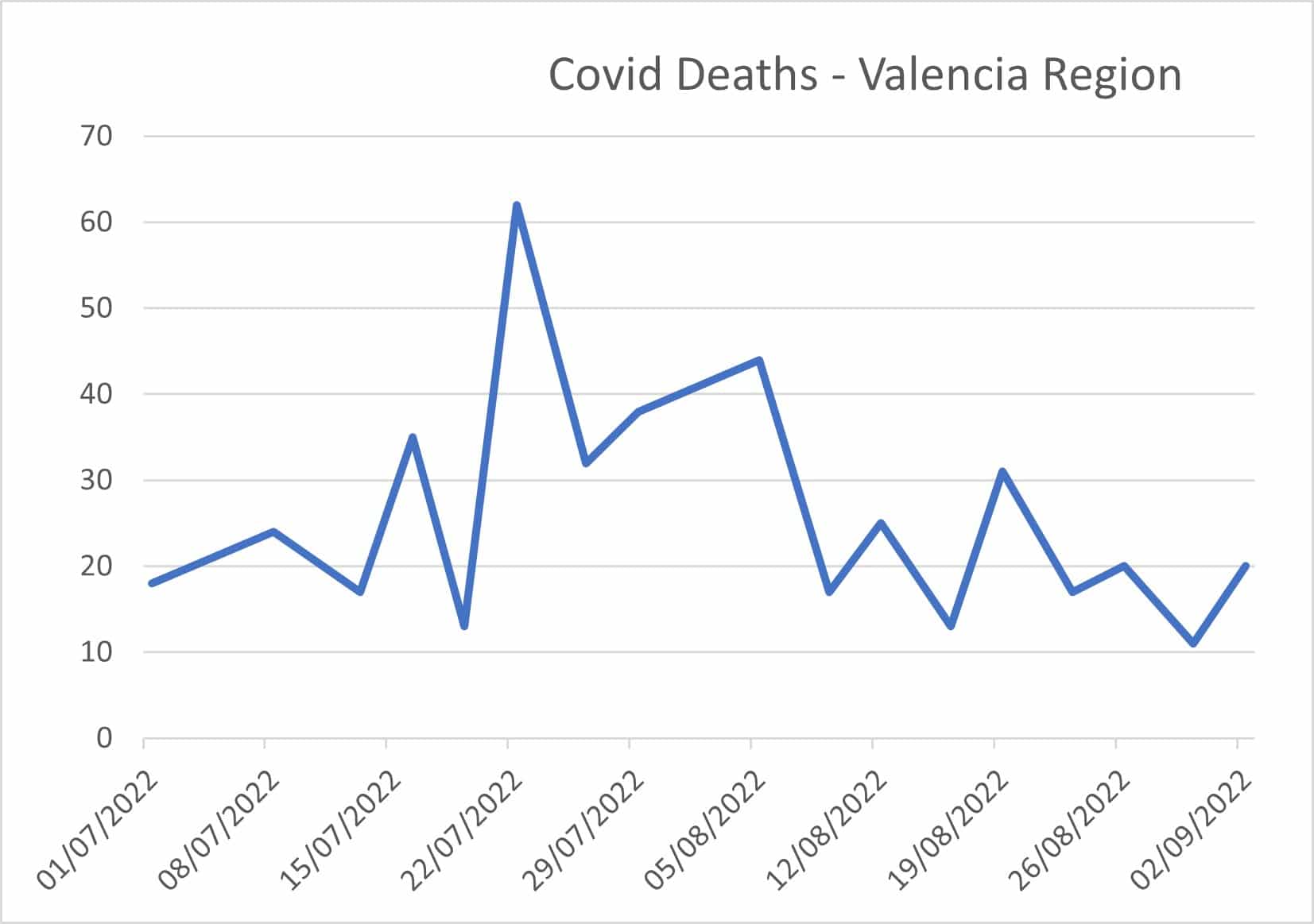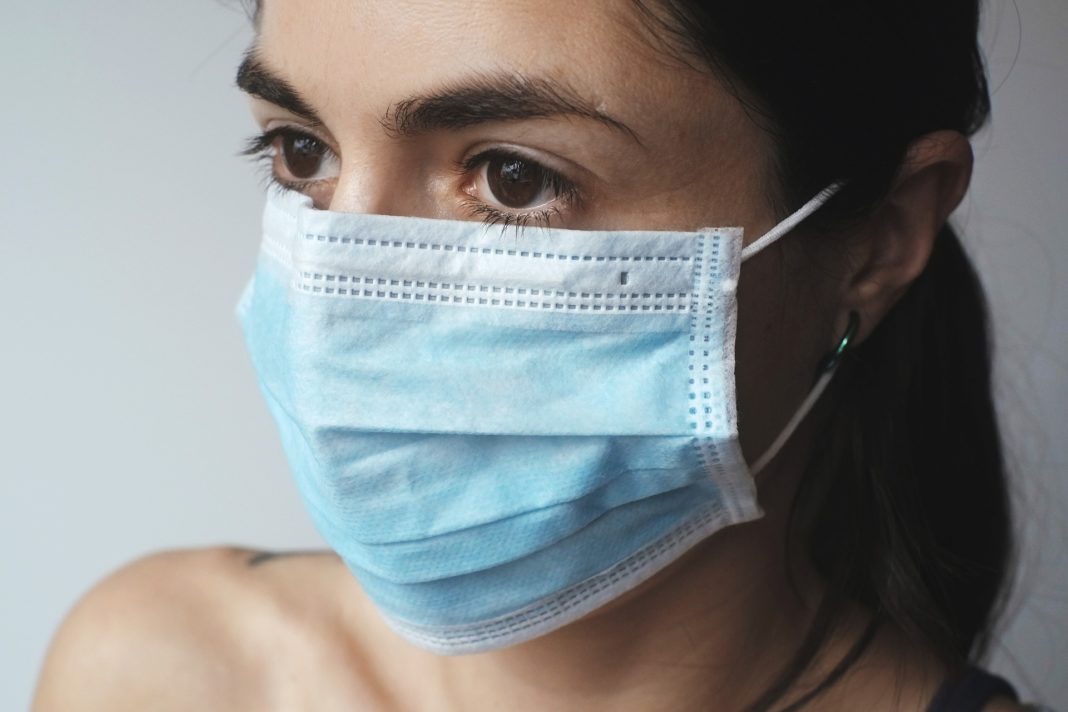The summer months were always expected to give some respite to Covid infections and deaths, and whilst that prediction has come true in part, the figures for both still remain high, and as the autumn and winter months approach, the situation is expected to worsen.
In the Valencia region alone, August ended with 237 deaths due to Covid. To put that figure into perspective, during the whole of 2021, there were a total of 115 fatalities on the roads of the region, and yet most people pay closer attention to road safety, we have mitigations such as seat belts, speed limits and traffic police, yet for Covid, where the deathrate for a single month is more than double that for the whole year on the roads, many people are still ignoring the threat.
According to data from the Ministry of Health, the rate is currently 183 cases per 100,000 inhabitants for the Valencia region, compared to 153 per 100,000 nationally, but it must be noted that this figure only includes those over 60 due to a change in the way testing and recording is carried out.
Infections have been steadily declining throughout summer, the latest figure being 1,146 new infections on Friday. It is worth pointing out again though that mass and routine testing is not carried out. The decline in infections is good news so far and is echoed in a number of hospitals in the region which have been able to declare themselves Covid-free, although not all.

The increase in infections that peaked in mid-July caused hospitals to register peak admissions again, both from patients who were admitted due to complications after becoming infected and from people hospitalised for other reasons who tested positive. The peak of hospitalised for coronavirus in this wave was recorded on July 12 with 1,226 patients at the same time.
Since that date, patients have been gradually declining: August began with 993 people hospitalised (with and for Covid) while on Tuesday there were 432, which is a reduction of 133 over last Friday. But again, the hospitals point out that there has been a change in reporting procedures, so the decline is not necessarily due to medical improvement.
Across Valencia, of the 432 admitted, 17 are in an ICU, 16 less than on Friday due to this change. However, the drop in the most serious patients this month has also been noted (August started with 54 serious patients).
Nationally, there are 3,023 patients admitted for Covid-19 throughout Spain (compared to 3,510 last Friday) and 210 in an ICU (241 were registered a week ago). The occupancy rate of beds occupied by coronavirus stands at 2.58 percent (compared to 3.06% last Friday) and in ICUs at 2.46 percent (compared to 2.91% reported a week ago).
Sadly though, despite the improving figures for infections and hospitalisations, the truth is that deaths this summer from the seventh wave have increased across Valencia. The total number of deaths from the virus is reached 10,000 on Friday in the region, which are only “official” deaths, those in which the person had a positive diagnosis, and their death was directly linked to the infection. Many deaths from the first months of the pandemic remain unrecorded when rapid coronavirus tests were not yet widespread, but also now there are deaths that are related to the infection but that occur later and are not directly linked.
This is precisely why the volume of deaths this summer and this seventh wave is explained: 237 since August 1 and 248 in July. Still, these are figures for reported deaths, not actual ones. We will have to wait to know the details of what date these deaths correspond to because there is always a gap. For example, of the 11 deaths from Tuesday, all had a death date of the last 14 days, except three from the end of July. According to the registry of “real” deaths that is being consolidated month after month, 281 people died in July, after including the deaths of the last few weeks that were reported in early August.

Those are the Valencia figures once again. Nationally, another 177 deaths were reported on Friday, which means a total of 112,804 people with a positive diagnostic test have died since the virus arrived in Spain, according to data collected by the Ministry.
Overall, in Spain, the positivity rate stands at 17.54 percent, up from 18.50 percent last week. The World Health Organisation (WHO) recommends that this figure be below 5 percent to consider the spread of the virus as ‘controlled’.
So, as summer does come to a close, the threat of a bleak winter looms, but just like dealing with our safety on the roads, we can all do our bit to help reduce infection. The campaign to administer the 4th dose of vaccine will begin shortly for those considered most vulnerable, the Minister of Health, Carolina Darias, stating “It is very feasible that the fourth dose will be in September, when the vaccines against omicron arrive”, however still only a little over 50% of the population have actually had their third dose, despite more than 90% taking the full two-dose inoculation. It is well documented that the effectiveness of the vaccine wanes over time, and so the importance of getting that booster, whether it is the third or fourth, is great.
If you haven’t been vaccinated, or need your third dose, the advice is to contact your medical centre where an appointment can be made to facilitate the jab.
In the Valencia region, it is still recommended that you wear a mask in busy or enclosed and poorly ventilated places, as well as nationally being mandatory on public transport, such as buses, taxis and on planes, and in health settings, including pharmacies.





